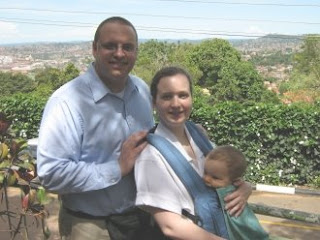
Merry Christmas from the Divito family!
During this holiday season, John will be taking a brief hiatus from blogging here at African Apologetics. Don't worry, he'll begin posting again after ringing in the new year. Until then, let us all celebrate the birth of our Savior into this world!
As we focus on the incarnation of our Lord Jesus Christ, we leave you with this insightful quote from John Owen:
His conception in the womb of the Virgin, as unto the integrity of human nature, was a miraculous operation of the divine power. But the prevention of that nature from any subsistence of its own--by its assumption into personal union with the Son of God, in the first instance of its conception--is that which is above all miracles, nor can be designed by that name. A mystery it is, so far above the order of all creating or providential operations, that it wholly transcends the sphere of them that are most miraculous. Herein did God glorify all the properties of the divine nature, acting in a way of infinite wisdom, grace, and condescension. The depths of the mystery hereof are open only unto him whose understanding is infinite, which no created understanding can comprehend. All other things were produced and effected by an outward emanation of power from God. He said, "Let there be light, and there was light." But this assumption of our nature into hypostatical union with the Son of God, this constitution of one and the same individual person in two natures so infinitely distinct as those of God and man--whereby the Eternal was made in time, the Infinite became finite, the Immortal mortal, yet continuing eternal, infinite, immortal--is that singular expression of divine wisdom, goodness, and power, wherein God will be admired and glorified unto all eternity. Herein was that change introduced into the whole first creation, whereby the blessed angels were exalted, Satan and his works ruined, mankind recovered from a dismal apostasy, all things made new, all things in heaven and earth reconciled and gathered into one Head, and a revenue of eternal glory raised unto God, incomparably above what the first constitution of all things in the order of nature could yield unto him.


 One fruit of your prayers for ACFAR—and the highlight of the year—was returning to Uganda with my wife in April. God has given me a deep love for this country, and she also fell in love with the people and the area. While we kept busy with research, planning, and ministry, our days in East Africa were unforgettable and marvelous.
One fruit of your prayers for ACFAR—and the highlight of the year—was returning to Uganda with my wife in April. God has given me a deep love for this country, and she also fell in love with the people and the area. While we kept busy with research, planning, and ministry, our days in East Africa were unforgettable and marvelous. Will we answer the cry from our brothers and sisters in Uganda? They’re asking us to equip them with the tools and the training they need to grow in biblical discernment and to resist and refute the intrusion of cults and false teaching. Will we help them to win cultists to Christ?
Will we answer the cry from our brothers and sisters in Uganda? They’re asking us to equip them with the tools and the training they need to grow in biblical discernment and to resist and refute the intrusion of cults and false teaching. Will we help them to win cultists to Christ?


 Having set aside our fears and troubles, we must honor Christ as holy in our hearts. The heart is the core of our being, the origin of all our behavior, and the place where Christ must reign supreme. And notice how we’re to do this—by “always being prepared to make a defense” of our faith. The phrase “make a defense” is a translation of the Greek word
Having set aside our fears and troubles, we must honor Christ as holy in our hearts. The heart is the core of our being, the origin of all our behavior, and the place where Christ must reign supreme. And notice how we’re to do this—by “always being prepared to make a defense” of our faith. The phrase “make a defense” is a translation of the Greek word 

